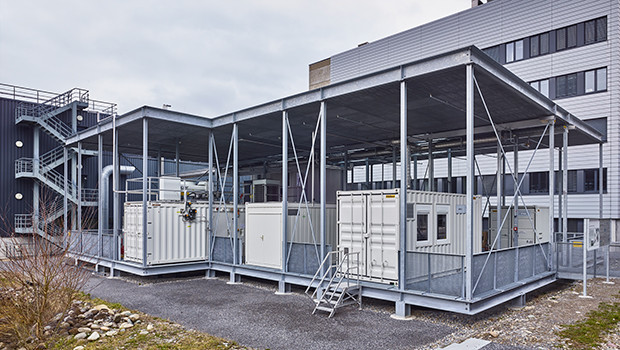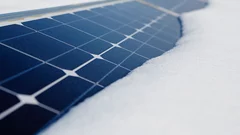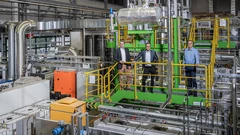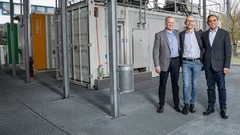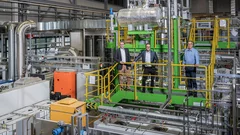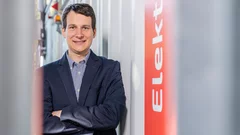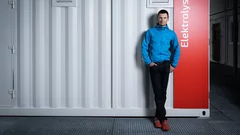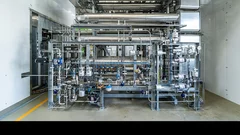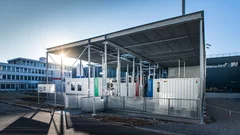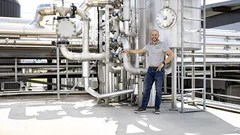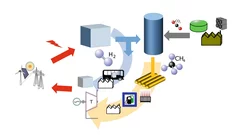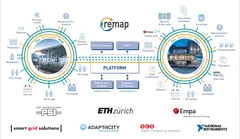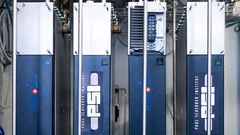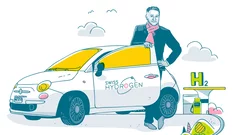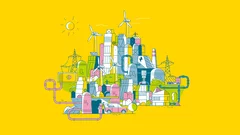ESI Platform
Step by step between now and the year 2050, the Swiss energy system is set to be overhauled. The federal government's package of measures known as Energy Strategy 2050
provides for a shift away from nuclear power. Energy consumption is expected to be reduced. New renewable sources such as solar energy, wind power, and energy from biomass should be expanded, and existing resources will be better utilised. With the Energy System Integration or ESI Platform, the Paul Scherrer Institute PSI offers research and industry a experimental platform where promising approaches can be tested in all their complex connections and interrelations.
Read more at: ESI Platform
Is climate-neutral air travel possible?
Air transport too is to become climate-neutral – how can sustainable fuels, like those developed at PSI, contribute to this?
How can cobalt be reduced in EV batteries?
The electrification of transport is increasing. This means, more batteries are needed. However, some of these batteries contain an extremely problematic raw material: cobalt. PSI is researching alternatives.
How can renewable electricity be used all year round?
The federal government’s Energy Strategy 2050 envisages a substantial expansion of photovoltaic systems. But where will the electricity come from when the sun isn’t shining? The solution could be hydrogen.
Methane as an energy store
Researchers at PSI and the start-up AlphaSYNT are working together on a solution for efficiently storing energy.
How can we secure our gas supply?
Switzerland depends entirely on foreign gas imports. How can we escape from this dependence and guarantee our gas supply? Synthetic methane might be a solution.
A greener alternative for aviation fuel
Air travel with no carbon footprint – PSI and the Metafuels AG develop a new technology to produce sustainable aviation fuel.
“More objectivity would be helpful”
The current energy debate could do with more facts and less gut feeling – argue Thomas J. Schmidt, renewables expert, and Andreas Pautz, nuclear energy specialist.
Combining forces for the energy transition
The Paul Scherrer Institute PSI and the start-up AlphaSYNT are piloting a new approach for storing energy in the form of methane gas.
Power-to-gas system for energy independence
New technology provides synthetic natural gas for domestic heating
Blue hydrogen can help protect the climate
The key is to eliminate methane leaks.
Getting maximum energy out of biomass
Researchers at the Paul Scherrer Institute PSI start operation of a revolutionary pilot plant for production of synthetic biogas.
Green fuels for aviation
In a new initiative, PSI and Empa want to jointly develop a process for producing kerosene from renewable resources.
Foundations for the energy system of tomorrow
On the way to a sustainable energy system, technologies that help to flexibly convert and efficiently store energy are becoming increasingly important. ReMaP, a novel research platform, aims to investigate these urgent issues under realistic conditions.
Clean biogas for a successful energy transition
PSI researchers have set up camp at a biogas plant near Lucerne. Between meadows and gigantic fermenters, they are investigating how they can remove impurities from the biogas to make this energy source even more usable.
The energy system of the future and Power-to-X
Researchers at the Paul Scherrer Institute PSI analyse the potential of Power-to-X for Switzerland's energy supply and present their conclusions in a white paper. One finding: The costs for energy from Power-to-X could fall by up to one-third.
Testing the energy system of the future today, as realistically as possible
With the kick-off of the ReMaP project, companies have another opportunity to test their vision for the energy system of the future now. PSI's ESI platform helps to make better and more intelligent use of renewable energy in the future.
Power on demand
If photovoltaic or wind power plants produce more electricity than the network can absorb, valuable energy is lost. At the ESI Platform, PSI researchers are investigating how fuel cells can contribute to making this energy usable in a targeted way through storage.
Profitable for both sides
The young company Swiss Hydrogen is located in Fribourg. Here work is under way on competitive high-performance fuel cells that could be used in environmentally friendly vehicles or deployed as stationary power generators. In the company's collaboration with PSI, as CEO Alexandre Closset explains in this interview, both sides profit.
New technology undergoes real-world testing
The Zurich-based power company Energie 360° provides natural gas, biogas, and wood pellets throughout Switzerland. Now, with the Paul Scherrer Institute PSI, it has successfully tested a new Power-to-Gas technology to be implemented in the area of biogas production. The joint project was awarded the Swiss energy prize Watt d'Or 2018. In this interview, division manager Peter Dietiker talks about the collaboration with PSI.
Using what's there
At the Paul Scherrer Institute PSI, researchers are looking for solutions that enable energy from the sun, the wind, or biomass to be efficiently integrated into the Swiss energy system.
